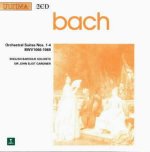In this recording of Bach’s Suite No. 1, John Eliot Gardiner follows Passepieds I and II with Bach’s own setting of the chorale Dir, dir, Jehova, will ich singen BWV 299. The joyous text celebrates praise and discipleship, prolonging the suite’s exuberant mood. No other recorded version features a vocal tailpiece, but if you don’t like it, simply program your player to skip track 8. It’s good to find both parts of the Overtures to these works repeated (Frans Brüggen omits second-section repeats), but at times Gardiner can seem too rugged and unyielding for what is, after all, ceremonial or occasional music. This applies particularly to the Sarabande of Suite No. 2, but the Rondeau brings nimble, spirited rhythms, and the concluding (very fast) Badinerie brings excellent breath control and articulation from the un-credited flute soloist. Gardiner doesn’t reduce ripieno strings, whereas Brüggen (with his Orchestra of the Age of Enlightenment) offers a new take on the piece by using single strings and two continuo lutes. Good as it is, Gardiner’s version lacks the chamber-like intimacy reduced forces afford.
But the real thrills come in the third and fourth Suites, in which trumpets and drums are added to the orchestra. Gardiner’s superb trumpeters revel in Bach’s stratospheric writing; strangely, though, the hide-headed timpani sound hollow compared to Brüggen’s, which are clearly audible even when they’re softly supporting harmonic pedal points. A pleasing feature of Gardiner’s reading of the famous Air from Suite No. 3 is its striking dynamic contrasts during repeats (tastefully ornamented) with plenty of air between the notes in cello and violone accompaniment figures. And with antiphonally divided violins, the counterpoint in the second section readily captures your ear. Finally, during the second Bourrée of Suite No. 4 you’ll detect some insecurity among the solo winds, both in terms of tuning and clarity. Again, Gardiner’s tempo is very quick–probably unrealistically so–and you’re left wondering if the music ever could be danceable at this speed. The same goes for the two Menuets, but the closing Réjouissance makes an undeniably strong impact. Recorded sound is bright, clear on top, and rather weak in the bass, but spatial detailing is excellent.
































